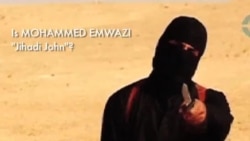Media reports said the masked Islamic State militant who appeared in several videos of hostage beheadings has been tentatively identified -- but security sources caution that the reports may not be accurate.
Reports Thursday quoted friends of Mohammed Emwazi as saying they believe he is the tall, London-accented speaker, dubbed "Jihadi John."
In the Islamic State videos, the man appears clad completely in black, with a mask over his face and a holster under his arm.
More Islamic State Coverage
More Islamic State Coverage
Read more VOA coverage of the Islamic State group in the Middle East and elsewhere.
A European security source, speaking to VOA, declined to confirm Emwazi was Jihadi John, saying “the story is much more complicated.”
The source, who spoke on condition of anonymity, said Emwazi was “heavily involved” with the British jihadist group within the Islamic State, nicknamed by Western captives as “the Beatles," who are involved in the beheadings of Western hostages.
US, British reaction
Neither the U.S. nor British governments would confirm the 27-year-old, Kuwaiti-born Emwazi, who grew up in West London and graduated with a computer programming degree from the University of Westminster, is the notorious knife-wielding executioner.
The U.S. National Security Council issued a statement, saying investigations are continuing into the execution of Western hostages by the militant Islamic State group.
“We will not comment on ongoing investigations and therefore are not in a position to confirm or deny the identity of this individual,” the NSC said in its statement following The Washington Post’s report Thursday that identified Jihadi John.
British officials also declined to comment and the head of Britain’s counter-terrorism agency urged the media to be cautious in its reporting, saying the lives of those still being held captive by the militants could be placed in even greater danger.
Emwazi's family declined a request for an interview, citing legal advice, according to the Post.
There was no answer at two addresses in west London where Emwazi was listed to have lived. Neighbors described the family as “normal people” and “friendly.”
Jihadi John, nicknamed by Western hostages, first appeared in a video last August overseeing the killing of American journalist James Foley.
He later appeared in beheading videos involving four other Western hostages: Britons David Haines and Alan Henning, and Americans Peter Kassig and Steven Sotloff. Last month, he also appeared in a video with Japanese hostages Haruna Yukawa and Kenji Goto shortly before they were killed.
In all of the videos Jihadi John, speaking in oddly accented British, taunted Western powers before holding his knife to the hostages' necks. The victims' decapitated bodies were then shown after the beheadings.
Identity sought
Because of the brutal nature of the Islamic State videos, British and U.S. intelligence services were ordered to uncover the identity of the masked man. Authorities used voice and facial recognition techniques, as well as interviews with former hostages.
CAGE, a civil rights group that works with Muslims in conflict with British intelligence services, has worked with Emwazi since 2009. CAGE activists sought to blame Emwazi’s radicalization on harassment by British and European intelligence agencies. CAGE was founded by former Guantanamo detainee Moazzam Begg.
Asim Qureshi, the research director at CAGE, said that although he could not be certain Emwazi was Jihadi John, there were some "striking similarities."
However, Qureshi told reporters, “There's one character that I remember, one kind person that I remember and then I see that image and there doesn't seem to be a correlation between the two."
The International Center for the Study of Radicalization at London's King's College, a leading resource for studying foreign jihadists, said it believed the identity "to be accurate and correct."
"The fact that Jihadi John has been unveiled in this manner demonstrates that whatever efforts are made, the ability to mask one's identity is limited or in fact impossible, and their true identities will eventually be revealed," the King's College research center said on its website.
Beginnings of radicalization
Friends and acquaintances said they believe he began to radicalize in the past few years, after trips to Africa and the Middle East.
According to media reports, he and two friends were going on a planned trip to Tanzania when authorities detained them upon landing in Dar es Salaam. They were eventually deported to Amsterdam.
While there, reports say Emwazi was interrogated by British and Dutch intelligence officers, who accused him of trying to join the Islamist militant group Al-Shabab in Somalia.
CAGE activists also claim British and Dutch intelligence sought to recruit him to spy on terrorists.
Media reports also said that Emwazi was angered after being barred three times from flying from London to Kuwait, according to emails he sent to the rights group CAGE. In a 2010 email, Emwazi claimed he "had a job waiting for me and marriage to get started" in Kuwait.
It was impossible to verify the version of events given by CAGE, which drew criticism for shifting the responsibility for Emwazi's crimes.
According to court documents obtained by the BBC, however, Emwazi’s radicalization would appear to have predated 2009.
The documents outlined his participation in a group of young West Londoners stretching back to 2007 who “associated regularly with members of a network of United Kingdom and East African-based extremists.” The documents allege the group provided “funding and equipment to Somalia for terrorism-related purposes.”
The Post reported Emwazi was believed to have traveled to Syria around 2012 and, later, to have joined the Islamic State group.
Jamie Dettmer contributed to this report from Rome. Some material for this report came from Reuters, AP and AFP.







